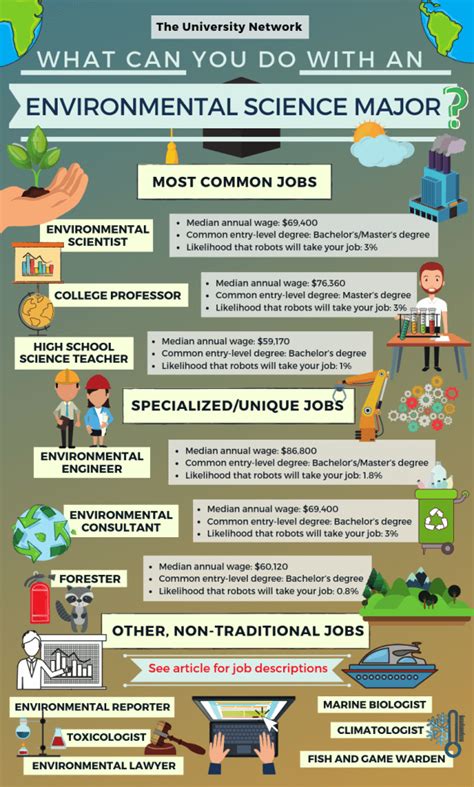The world is confronting unprecedented environmental issues, and qualified experts are in high demand to address these challenges. An environmental science degree equips graduates with a solid understanding of the environment and the skills necessary to make a meaningful impact. This comprehensive guide will explore the diverse range of jobs available to individuals with an environmental science degree, providing insights into their roles, responsibilities, and earning potential.

Environmental Consulting
Role: Environmental consultants provide expert advice and solutions to organizations seeking to minimize their environmental impact and comply with regulations. They conduct environmental assessments, develop sustainable strategies, and manage environmental compliance programs.
Responsibilities:
- Conduct environmental impact assessments
- Develop and implement environmental management plans
- Manage air, water, and waste compliance programs
- Provide expert testimony and guidance on environmental issues
Earning Potential: According to the U.S. Bureau of Labor Statistics (BLS), environmental consultants earned a median salary of $62,110 in May 2021. The top 10% earned over $115,400.
Environmental Policy and Regulation
Role: Environmental policy and regulation specialists play a crucial role in developing and enforcing policies that protect the environment. They work in government agencies, nonprofit organizations, and industry to ensure compliance with environmental laws and regulations.
Responsibilities:
- Develop and implement environmental policies
- Enforce environmental regulations
- Conduct environmental monitoring and reporting
- Provide technical assistance on environmental issues
Earning Potential: The BLS reports that environmental policy analysts earned a median salary of $82,300 in May 2021. The top 10% earned over $137,120.
Environmental Engineering
Role: Environmental engineers design and implement solutions to environmental problems related to water treatment, air pollution control, and hazardous waste management. They work in various industries, including consulting, government, and manufacturing.
Responsibilities:
- Design and operate water treatment plants
- Control air pollution from industrial sources
- Manage hazardous waste disposal
- Conduct environmental modeling and analysis
Earning Potential: Environmental engineers earned a median salary of $92,190 in May 2021, according to the BLS. The top 10% earned over $139,680.
Environmental Education and Outreach
Role: Environmental educators and outreach specialists aim to raise awareness and promote environmental stewardship. They work in schools, museums, and nonprofit organizations to educate the public about environmental issues.
Responsibilities:
- Develop and deliver educational programs
- Conduct outreach campaigns
- Engage with stakeholders to promote environmental action
- Write and produce educational materials
Earning Potential: The BLS does not provide specific salary data for environmental educators. However, teachers in secondary schools earned a median salary of $61,660 in May 2021.
Natural Resource Management
Role: Natural resource managers work to protect and manage natural resources, such as forests, grasslands, and wildlife. They work in government agencies, nonprofit organizations, and private companies to ensure the sustainable use of natural resources.
Responsibilities:
- Develop and implement natural resource management plans
- Monitor and assess natural resource health
- Conduct restoration and conservation projects
- Manage recreational activities on public lands
Earning Potential: According to the BLS, natural resource managers earned a median salary of $77,060 in May 2021. The top 10% earned over $123,870.
Other Environmental Science Jobs
In addition to the primary job categories listed above, individuals with an environmental science degree may also pursue careers in the following areas:
- Environmental Health and Toxicology: Focuses on the effects of environmental contaminants on human health and ecosystems.
- Environmental Monitoring and Assessment: Collects and analyzes data to measure environmental quality and monitor trends.
- Environmental Modeling and Forecasting: Uses computer models to predict environmental impacts and inform decision-making.
Conclusion
An environmental science degree provides graduates with a solid foundation to pursue a rewarding career in the dynamic field of environmental protection. With the growing demand for qualified environmental professionals, graduates can expect ample job opportunities in various industries and sectors. Whether they choose to work in environmental consulting, policy and regulation, engineering, education, or natural resource management, individuals with an environmental science degree can make a meaningful contribution to protecting our planet for future generations.
Frequently Asked Questions
What is the job outlook for environmental science graduates?
The job outlook for environmental science graduates is projected to be positive, with the BLS anticipating a 10% growth in employment from 2020 to 2030.
What are the highest-paying environmental science jobs?
According to the BLS, the highest-paying environmental science jobs include:
| Job Title | Median Salary | Top 10% Earners |
|---|---|---|
| Environmental Engineers | $92,190 | $139,680 |
| Environmental Policy Analysts | $82,300 | $137,120 |
| Environmental Consultants | $62,110 | $115,400 |
What are the common mistakes to avoid when applying for environmental science jobs?
Some common mistakes to avoid include:
- Not tailoring your resume and cover letter: Highlight your relevant skills and experience for each job you apply for.
- Not researching the organization: Learn about the organization’s mission, values, and environmental initiatives to demonstrate your fit.
- Neglecting soft skills: Environmental science jobs often require strong communication, teamwork, and problem-solving abilities.
- Overlooking industry certifications: Consider earning certifications such as the Professional Environmental Manager (PEM) or Certified Professional Soil Scientist (CPSS) to enhance your credibility.
